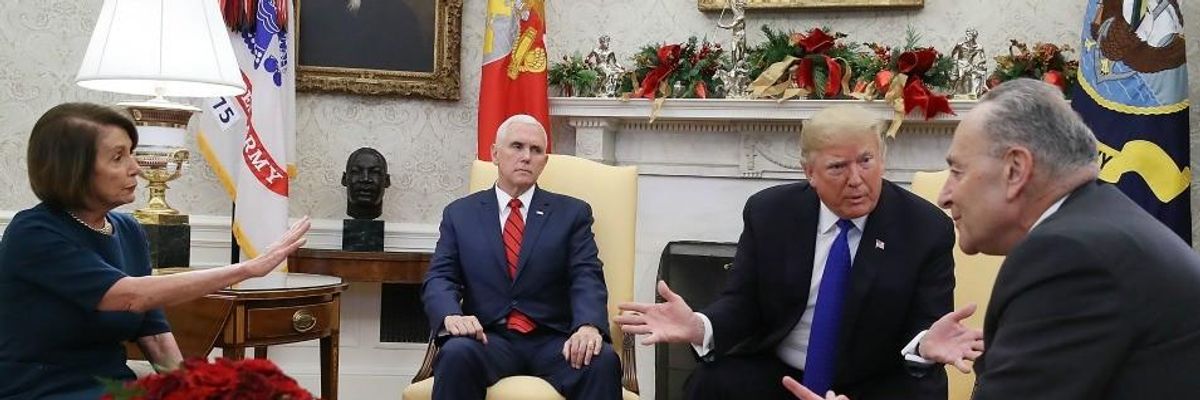With President Donald Trump and Democratic leaders set to meet Wednesday to discuss a possible $2 trillion infrastructure package, a progressive advocacy group on Monday warned that any proposal that doesn't include significant tax hikes on the rich and corporations "will be meaningless and doomed to failure."
"Without asking more from the wealthy and corporations, the plan will be just another empty promise while our roads, bridges, rail lines, and public buildings continue to deteriorate."
--Frank Clemente, Americans for Tax Fairness
"If major tax increases are off the table, there is no way to pay for a $2 trillion infrastructure plan, it's that simple," Frank Clemente, executive director of Americans for Tax Fairness (ATF), said in a statement. "Other options, such as raising the gas tax, might be part of the package, but by themselves won't come close to reaching the $2 trillion that's needed."
During his scheduled meeting with House Speaker Nancy Pelosi (D-Calif.) and Senate Minority Leader Chuck Schumer (D-N.Y.), Trump is expected to unveil a plan to fund an infrastructure package.
"It will be interesting to see what the president comes up with," said Clemente. "But without asking more from the wealthy and corporations, the plan will be just another empty promise while our roads, bridges, rail lines, and public buildings continue to deteriorate."
Clemente pointed out that while Senate Democrats have proposed rolling back some of the tax cuts for the rich and corporations in the Trump-GOP tax law as a way to pay for an ambitious infrastructure plan, congressional Republicans have signaled they would oppose such a move.
And, as The Hillreported last week, Republicans in Congress "have indicated they are unlikely to support an infrastructure package" with a $2 trillion price tag "unless they can reach a deal on how to pay for it without adding to the deficit."
"None of these objections were raised by Republicans when they passed their tax cuts for the wealthy and big corporations that weren't paid for and added nearly $2 trillion to the debt," Clemente said. "They continue to insist that the tax cuts will pay for themselves, but that won't happen."
ATF offered five possible funding mechanisms for a $2 trillion infrastructure plan:
- Assessing an annual tax on extreme wealth: Sen. Elizabeth Warren (D-Mass.) has proposed an "Ultra-Millionaires Tax" of 2 percent on the portion of a household's net worth exceeding $50 million, and a 3 percent tax on the portion exceeding $1 billion, which could raise $2.75 trillion;
- Taxing wealth more like work: Ending or reducing the tax discount on certain investment income so the tax rate paid by the rich on their income from stocks (currently about 24 percent) more closely matches the 37 percent top tax rate paid on wages and salaries along with other investment-income reforms could raise up to $2.4 trillion.
- Placing a surtax on super-high incomes: A 10 percent surtax on that part of a couple's income above $2 million could raise up to $800 billion;
- Making corporations, who arguably benefit most from public infrastructure spending, pay more by increasing their income tax rate from the current 21 percent (Senate Democrats proposed to 25 percent). Every 1 percentage point increase raises about $100 billion--a 25 percent rate would raise about $360 billion; a 28 percent rate would raise nearly $700 billion and a 35 percent rate restoration would collect about $1.3 trillion;
- Taxing Wall Street trades: A tax of just 10 cents on every $100 in trades could raise $777 billion, according to CBO. It would also slow the high-frequency trading of stock market speculators that destabilizes markets for long-term investors.
Following negotiations with Trump last month, Schumer told reporters that Democrats called for 80 percent of the infrastructure plan to be funded by the federal government and 20 percent by localities. At the time, The Hill reported, Schumer also suggested including a "public-private partnership element" in the plan.
While Trump's infrastructure proposal last year called for public-private partnerships, the president last month denounced such arrangements as "stupid" because "you get sued."
ATF also expressed opposition to public-private partnerships, but for entirely different reasons.
"Only about 12 percent of infrastructure projects offer a return that would attract private investment," according to ATF, "and the tolls and fees necessary to make the projects viable would disproportionately tax working families while providing long-term guaranteed profits for big corporations and Wall Street."
